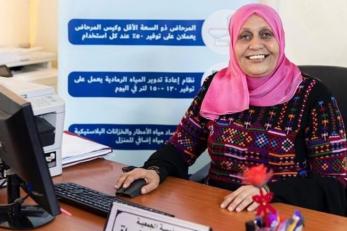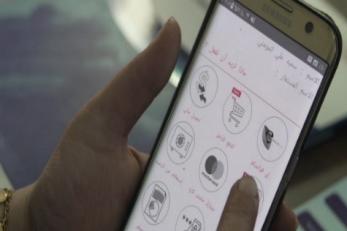USAID/WIT supports solving water challenges – Ghada Al-Qudah’s story

In rural areas, water is supplied once every two weeks, with reduced frequency during the summer. Each household then pumps the water into a rooftop tank, which allows the water to be used until it is supplied again. The limited amount of water stored in the tank, however, requires that households monitor their water carefully to make sure they do not run out. Water-saving technologies, such as high-efficiency water-saving devices, rainwater harvesting systems, and gray-water systems help households stretch their water reserves to cover a longer period of time. Unfortunately, affordability has always been a barrier to adopting these technologies, but with the Water Innovation Technology (WIT) revolving loans activity, households have longer repayment periods and require less collateral to help price-sensitive households purchase water-saving technologies.
USAID’s WIT activity provided Ms. Al-Qudah’s association a grant to support solving local water challenges. Under the guidance of USAID partner, Mercy Corps, the women dug safe domestic-wells reservoirs to collect rainwater and installed electric pumps to deliver the water to local homes. In addition, the women helped install and provide instruction on water-saving devices such as water filters and gray-water systems. This grant increased public confidence in the association because with the new reservoirs people no longer needed to purchase water tankers. The association also facilitated payment methods by opening electronic wallets for project beneficiaries, which was particularly welcome with COVID‑19 concerns.

“Each and every woman is capable of having a job, even if it is through their own small private business. You should never wait for a job opportunity to come to you.” Ghada Al-Qudah is the founder and president of the Fatima Al-Zahra Cooperative Association, which was established in 1990 in Ain Janna - Ajloun Governorate. The association is made up of 56 women who serve the local community. Ghada says that what motivated her to do development work was the support of the surrounding community and her family. Ghada welcomed the new responsibility that rested on her shoulders because it made her stronger and more capable of facing difficulties like COVID‑19. Her advice to all women is to fight the culture of shame and to start their own private business, even if it is home-based.
In an effort to increase the availability and affordability of water-saving technologies, USAID’s WIT Project and Mercy Corps will continue to implement a variety of activities to help households and communities better understand what technologies and practices are available to them. The project anticipates reaching wider households in order to create demand for water-saving technologies and devices to reduce inefficient water usage, thus protecting Jordan’s vital water resources.